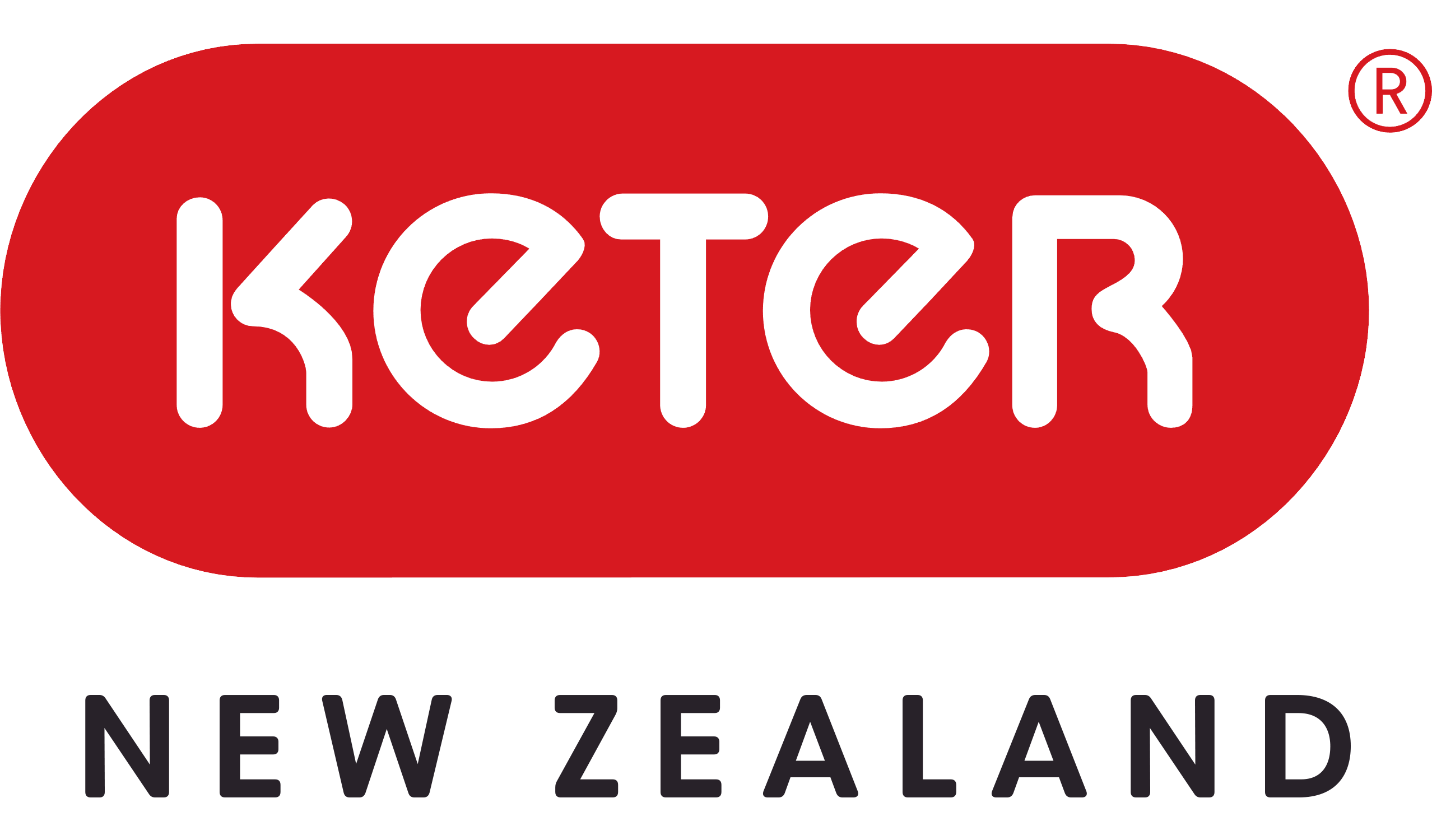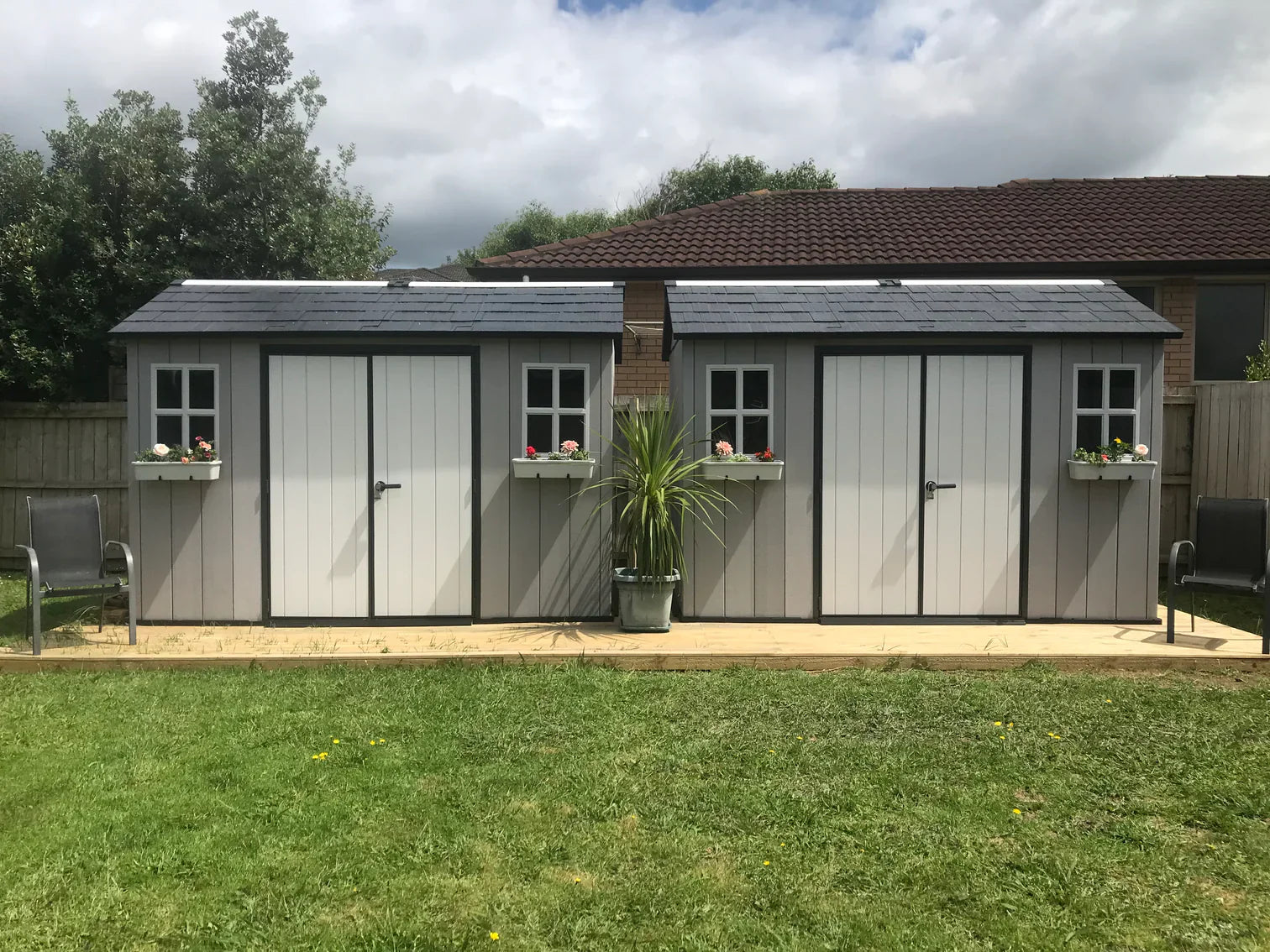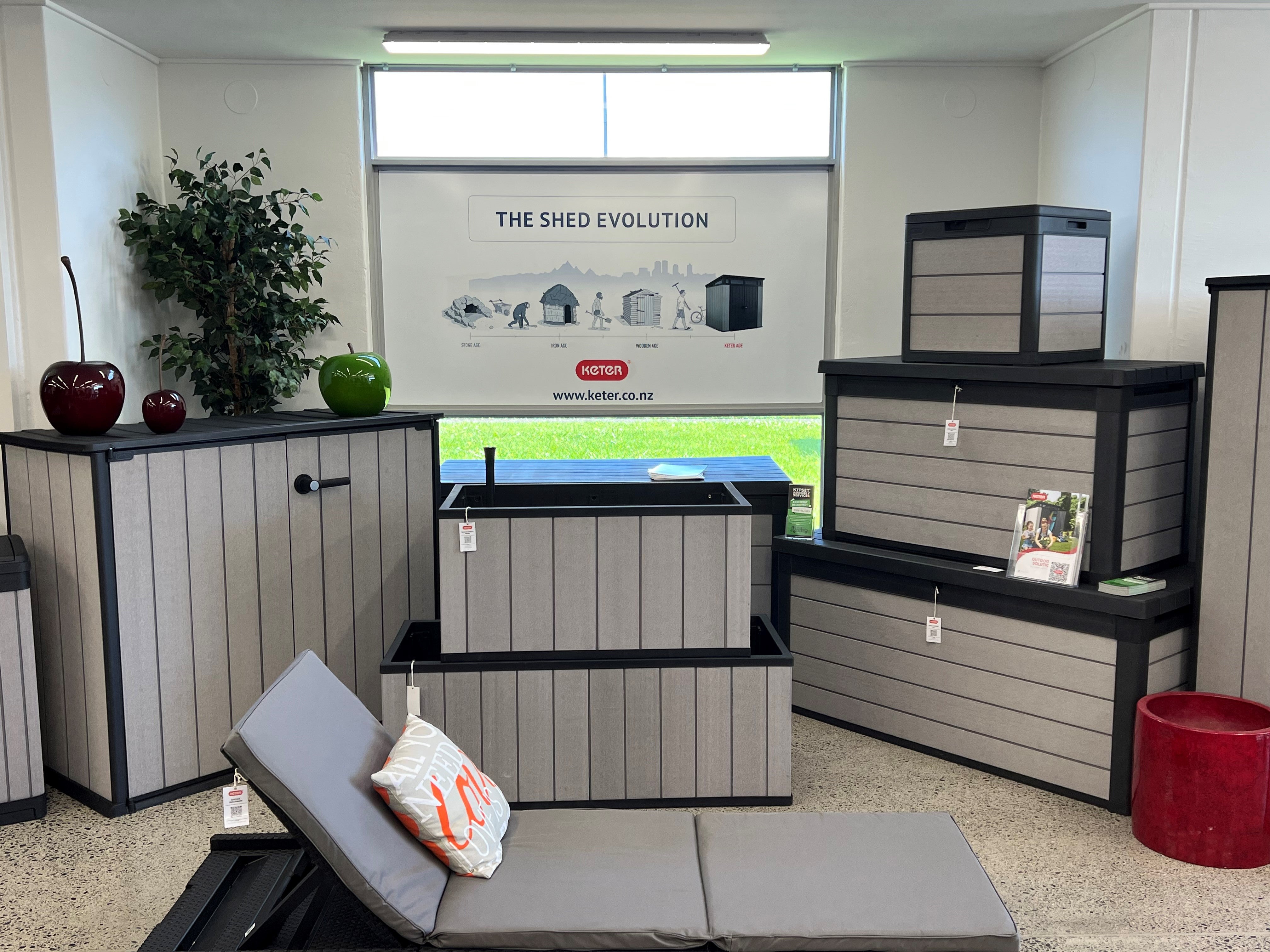Resin versus Wood versus Metal
So you're ready to get an outdoor shed - the perfect place to keep your gardening tools, sports equipment, and other items organised. And you're wondering, what's the best material for your home, your wallet, and the earth? Today, we'll go through three main materials used for garden sheds - resin, wood, and metal. See below the advantages and disadvantages of each shed material so you can choose the perfect shed for your needs.
What are the advantages of resin sheds?
Resin sheds are a great option for versatility, affordability, and sustainability. Our quality Keter sheds combine most of the benefits of other materials while simultaneously addressing their disadvantages.
- Easy cleaning and low maintenance
- Rot, insect, and rust-resistant
- Easy to assemble
Resin plastic sheds are easy to clean, light enough to transport, and can be assembled in one afternoon. One of the great things about this material is it needs very little maintenance, and remains extremely durable and resistant to all weather conditions. Keter’s recycled shed materials also make resin a sustainable and visually appealing alternative to other sheds. Here is a video that summarises the advantages and disadvantages of resin.
Things to keep in mind when using a resin shed
Resin plastic sheds have limited disadvantages. They need to be anchored to a base and can’t hold as much weight. These sheds also tend to be pricier than metal sheds (but less expensive than wooden sheds).
Advantages of wooden sheds
Wood sheds provide a rustic, classic look that can enhance any space. They are usually assembled using framing lumber and pressure-treated plywood to create that traditional wood appeal.
- Strong and durable
- Visually appealing
- Easy to customise
Many people choose timber sheds due their strong aesthetic appeal - especially when they are looking for an attractive shed to match existing outdoor decor. Wood sheds are typically very strong and durable without needing to be anchored to the ground.
Disadvantages of wooden sheds
Wooden sheds are often pricier and can easily rot. They also aren’t the lowest maintenance, if you want to make sure your shed remains weather-resistant in the long term. However, Keter does have resin-based sheds that replicate the look and feel of a wooden shed without the associated risks of invasive bugs taking an interest in your shed.
What about metal sheds?
For an affordable and durable choice, metal sheds come in different gauges of thickness and are created using steel or galvanised aluminium.
- Low maintenance
- Durable
- Fire, insect, and rot-resistant
Unlike wooden sheds, metal sheds are resistant to fire, insects, rot, and weather damage, making them a zero-maintenance shed type. Due to the sheer strength of the material, a metal shed can also offer greater security for your garden furniture and other stored goods.
Disadvantages of metal sheds
Metal sheds must be anchored to a base and are limited in size, styles, and customisations compared to resin and wooden sheds. They’re difficult to transport and heat up very quickly in natural light, making them less suitable to use as a workspace. Furthermore, metal sheds aren’t rust-resistant and can be time-consuming to assemble and keep clean.
What’s the best type of shed, then? Commonly asked questions...
Is a resin shed better than a metal shed?
Your best choice between a resin vs. a metal shed depends what you want to use it for! If you are looking for a shed to work in, resin is the better option, as metal will get very hot in direct sunlight. Resin sheds are also easier to transport and assemble. Resin sheds come in a greater variety of designs, making them the better choice if appearances are a high priority. However, if you’re looking for a durable and inexpensive option, then metal is the best garden shed material.
Are wood or resin sheds better?
Choosing between metal vs. wood depends on what qualities you care the most about in your shed. If you’re looking for a more affordable and weather-resistant shed, resin is the better option. Resin sheds are weather-resistant against rotting, peeling, rusting, insects, warping, and fading. Resin is also easier to maintain and assemble. If appearance is important to you, both resin and wood can give you the same classic wood appearance – Keter provides resin-based sheds that replicate the look of a wooden shed with all the benefits of a resin shed.
Are resin sheds eco-friendly?
Unlike other plastic sheds, Keter’s resin sheds use 100% recyclable materials, making them an environmentally conscious choice. Their sturdy construction sets them up to be used for life, making them a better option than a wooden shed, which is more susceptible to the elements. Thanks to these points, resin sheds are increasingly popular in New Zealand.
What should I prepare before building my shed?
- Once you’ve decided on your chosen shed building materials, you’ll need to research the required preparations for that type of shed carefully.
- For example, if you buy a resin shed kit, you’ll want to find a flat surface to put it on and clear the area of rocks or debris. Then, put down the shed's base. While this varies a little from shed to shed, you’ll always need a clear, flat area so your base is level, which will make the shed more sturdy.
- In some cases, you may want to lay a foundation for your shed. You can make the foundation out of pavers, wood, or even concrete. This is based on preference and will depend on your outdoor space.
- No matter which material you choose, you should always follow instructions and be cautious while building your storage shed. If any trouble arises, research the problem carefully and speak with an expert. Regular maintenance is key to keeping your garden shed looking good and staying strong.
Monthly maintenance checklist
- Inspect the walls for damage and clean away any mould.
- Check the shed roof for damage and sweep away any leaves or dirt that’s settled on top.
- Inspect the inside of your shed to look for starting signs of cracks or mouse or insect damage.
- Check for any signs of possible leaks, such as pools of water or moisture damage.
So, what’s the best shed material, and which type should I buy?
The differences between the three materials we’ve discussed so far can be split into four categories: price, durability, maintenance, and assembly:
Price: Wooden sheds are the most expensive option, while metal sheds are the cheapest. Resin sheds are between the two. In addition to the initial cost, it’s also important to note the cost of upkeep – a wooden shed requires more maintenance than metal and plastic sheds, so it’s not the best material if you want to keep prices low.
Durability: While all these different shed building materials will get the job done in terms of storage, metal and resin are the best choices for high strength with less maintenance. Tougher construction means these sheds last longer and are more environmentally friendly– especially our quality Keter resin plastic sheds, which are made from recycled materials.
Maintenance: Wooden sheds are not resistant to fire or rotting and often aren’t waterproof, either. Metal sheds are more durable as they are fire, insect, rot, and weather resistant. They can rust, but they are more durable to the elements compared to wood. Resin is the most durable because it’s resistant to fading, rusting, warping, rotting, fungal decay, insects, and fire.
Assembly: Some wooden sheds are already built and only require installation. However, most wooden sheds are difficult to build and require a lot of work and patience. Metal sheds are also tough to install and transport once built. Due to their lightweight material, resin kitset sheds are the easiest to put together and move.
Overall, if you’re looking for a new garden shed, resin is the best material for anyone who wants to purchase a cost-effective, attractive shed and never worry about maintenance again.
Keter resin sheds and storage solutions
Interested in learning more? Keter’s wide variety of resin sheds lets you store all your garden tools and gear with ease. If you’re looking for other quality smaller sheds and storage options, browse our huge range of mini sheds, boxes, and shelving. Our versatile resin products are UV-protected and designed to last, making them the perfect choice for your home backyard.



